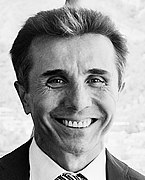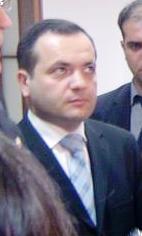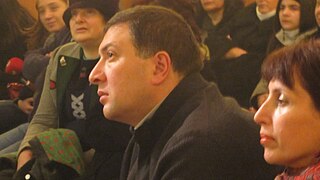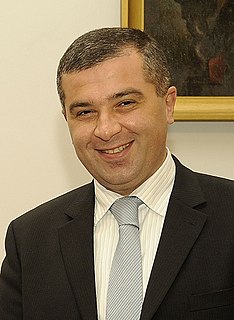| ||||||||||||||||||||||||||||
All 150 seats to the Parliament 76 seats needed for a majority | ||||||||||||||||||||||||||||
| Turnout | 59.76% | |||||||||||||||||||||||||||
| ||||||||||||||||||||||||||||
Map of electoral districts, winners by party-list. | ||||||||||||||||||||||||||||
| ||||||||||||||||||||||||||||
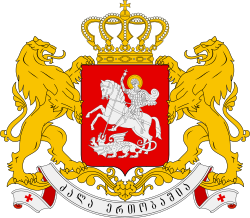 |
|---|
| This article is part of a series on the politics and government of Georgia |
Legislature |
Judiciary |
The Georgian parliamentary election of 2012 was held on 1 October 2012 in Georgia. It was the 7th legislative election held since independence from the Soviet Union in 1991. [1] The opposition Georgian Dream coalition of billionaire businessman Bidzina Ivanishvili won a majority of seats. President Mikheil Saakashvili conceded his party's loss. [2]

Georgia is a country in the Caucasus region of Eurasia. Located at the crossroads of Western Asia and Eastern Europe, it is bounded to the west by the Black Sea, to the north by Russia, to the south by Turkey and Armenia, and to the southeast by Azerbaijan. The capital and largest city is Tbilisi. Georgia covers a territory of 69,700 square kilometres (26,911 sq mi), and its 2017 population is about 3.718 million. Georgia is a unitary semi-presidential republic, with the government elected through a representative democracy.

Elections in Georgia gives information on elections and election results in Georgia. An election is a process in which a vote is held to elect candidates to an office. It is the mechanism by which a democracy fills elective offices in the legislature, and sometimes the executive and judiciary, and in which electorates choose local government officials.

The Soviet Union, officially the Union of Soviet Socialist Republics (USSR), was a socialist state in Eurasia that existed from 1922 to 1991. Nominally a union of multiple national Soviet republics, its government and economy were highly centralized. The country was a one-party state, governed by the Communist Party with Moscow as its capital in its largest republic, the Russian Soviet Federative Socialist Republic. Other major urban centres were Leningrad, Kiev, Minsk, Alma-Ata, and Novosibirsk. It spanned over 10,000 kilometres east to west across 11 time zones, and over 7,200 kilometres north to south. It had five climate zones: tundra, taiga, steppes, desert and mountains.
Contents
- Background
- Protests
- 2010 constitutional amendments
- 2010–2011 electoral reform talks
- Parties
- Campaign
- Demonstrations
- Foreign support
- Electoral observers
- Exit polls
- Results
- Reactions
- International
- References
The election was held according to a reformed electoral system agreed upon by the incumbent and several opposition parties in 2011. [3] 77 of the 150 seats were allocated proportionally to party lists, the remaining 73 to the winners in single-member constituencies. [4] The new parliament was relocated from the capital of Tbilisi to the country's second largest city of Kutaisi later in 2012. [3] A new government was also formed following the scheduled 2013 presidential election as envisaged by the 2010 constitutional amendments. [5] South Ossetia and Abkhazia did not vote.
A single-member district or single-member constituency is an electoral district that returns one officeholder to a body with multiple members such as a legislature. This is also sometimes called single-winner voting or winner takes all. The alternative are multi-member districts, or the election of a body by the whole electorate voting as one constituency.

Tbilisi, in some countries also still known by its pre-1936 international designation Tiflis, is the capital and the largest city of Georgia, lying on the banks of the Kura River with a population of approximately 1.5 million people. Founded in the 5th century AD by Vakhtang I of Iberia, since then Tbilisi served as the capital of various Georgian kingdoms and republics. Between 1801 and 1917, then part of the Russian Empire, Tbilisi was the seat of the Imperial Viceroy, governing both Southern and Northern Caucasus.
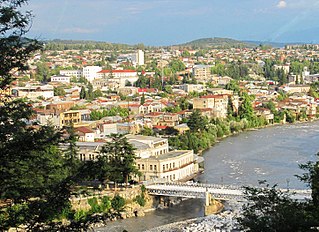
Kutaisi is the 3rd most populous city in Georgia, traditionally, second in importance, after the capital city of Tbilisi. Situated 221 kilometres west of Tbilisi, on the Rioni River, it is the capital of the western region of Imereti. Historically one of the major cities of Georgia, it served as the capital of the Kingdom of Georgia in the Middle Ages, and later as the capital of the Kingdom of Imereti. From October 2012 to December 2018, Kutaisi briefly was the seat of the Parliament of Georgia as an effort to decentralise the Georgian government.
